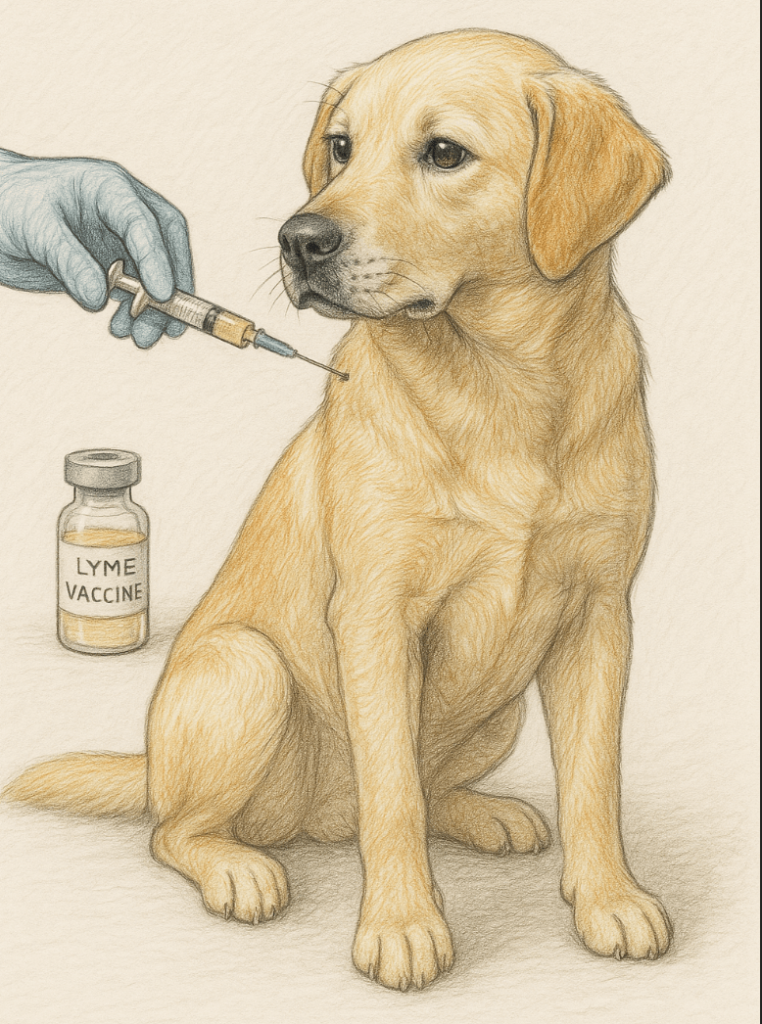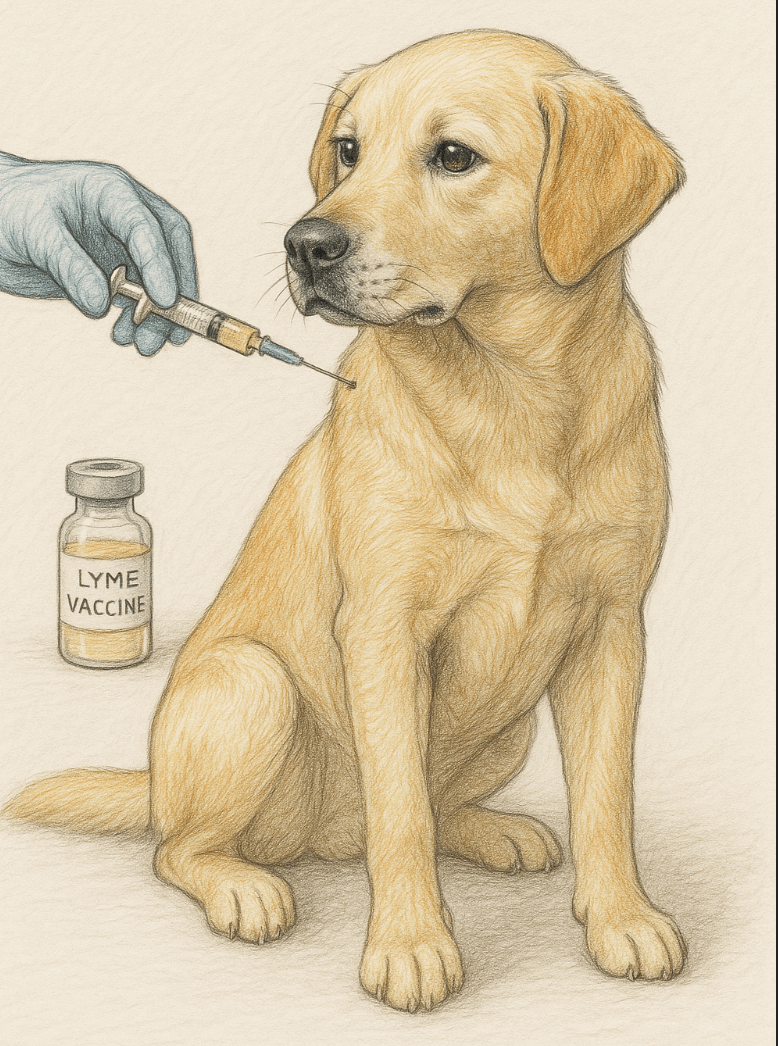Lyme Vaccine for Dogs: Is It Worth It?
Lyme disease, a tick-borne illness caused by the bacterium Borrelia burgdorferi, is a growing concern for dog owners, especially in regions where ticks are prevalent. While prevention through tick control remains the first line of defense, the Lyme vaccine for dogs offers an additional layer of protection. But is it necessary for your furry friend? Understanding how the vaccine works, its benefits, and potential risks is crucial to making an informed decision. In this blog post, we’ll explore everything you need to know about the Lyme vaccine for dogs, helping you safeguard your pet’s health effectively.
Expert Insight on the Lyme Vaccine for Dogs
“The Lyme vaccine helps to prevent Lyme disease in dogs, a bacterial infection that’s transmitted by blacklegged (aka deer or Ixodes) ticks that tend to live in woods and tall grasses in many parts of the country.”
How Does the Lyme Vaccine Work?
The Lyme vaccine is designed to protect dogs from contracting Lyme disease by targeting the bacteria transmitted through tick bites. Here’s a breakdown of how it functions and what you can expect:
Targets Specific Proteins:
The vaccine stimulates the immune system to recognize and attack specific proteins on the surface of the Borrelia burgdorferi bacteria.Boosts Immune Response:
By introducing harmless components of the bacteria, the vaccine trains the body to mount a rapid defense if exposed to the real pathogen.Requires Multiple Doses:
Initial vaccination typically involves two doses administered a few weeks apart, followed by annual boosters to maintain immunity.Not a Standalone Solution:
The vaccine works best when combined with other preventive measures, such as tick checks and topical treatments.Reduces Severity of Symptoms:
Even if a vaccinated dog contracts Lyme disease, the vaccine can help minimize symptoms and complications.
Understanding how the Lyme vaccine operates helps clarify its role in protecting your dog against this potentially debilitating illness.

Benefits of the Lyme Vaccine for Dogs
The Lyme vaccine offers several advantages, particularly for dogs living in high-risk areas. These benefits make it a valuable tool in your pet’s healthcare arsenal.
Prevents Severe Complications:
Vaccinated dogs are less likely to develop serious conditions like Lyme nephritis, a kidney disorder linked to Lyme disease.Cost-Effective Protection:
Preventing Lyme disease through vaccination is often more affordable than treating the illness once symptoms arise.Peace of Mind for Owners:
Knowing your dog has an added layer of protection provides reassurance, especially during outdoor adventures.Supports Active Lifestyles:
Dogs that spend significant time outdoors or in wooded areas benefit greatly from the extra safeguard the vaccine provides.Complements Tick Prevention:
The vaccine enhances the effectiveness of tick control methods, creating a comprehensive defense strategy.
By vaccinating your dog, you’re taking proactive steps to ensure their long-term health and happiness.
Check this guide 👉Understanding the DAPP Dog Vaccine: Best 7 Expert Tips!
Check this guide 👉What Is the CPIV Vaccine for Dogs? Best 7 Expert Tips!
Check this guide 👉DHPP Vaccine for Dogs: Best 7 Expert Tips!
Pros of the Lyme Vaccine | Cons of the Lyme Vaccine |
|---|---|
Reduces risk of severe Lyme symptoms | Not 100% effective against all strains |
Cost-effective compared to treatment | Potential side effects (e.g., soreness) |
Provides peace of mind for pet owners | Requires annual boosters for maintenance |
Supports active, outdoor lifestyles | May not be necessary for low-risk areas |
Enhances tick prevention strategies | Limited data on long-term safety |
Signs Your Dog May Need the Lyme Vaccine
Not every dog requires the Lyme vaccine, but certain factors increase the likelihood that it could benefit your pet. Consider these indicators when deciding whether to vaccinate:
Living in Endemic Areas:
If you reside in regions with high tick populations, such as the Northeastern United States, the vaccine may be essential.Frequent Outdoor Activity:
Dogs that hike, swim, or explore wooded areas are at greater risk of encountering ticks.History of Tick Exposure:
Pets previously diagnosed with tick-borne illnesses may benefit from added protection.Limited Tick Prevention Measures:
If consistent use of tick repellents isn’t feasible, the vaccine becomes more critical.Veterinarian Recommendations:
Your vet may suggest the vaccine based on your dog’s lifestyle, age, and overall health.
Assessing these factors ensures you make the right choice for your dog’s unique needs.
Potential Side Effects of the Lyme Vaccine
Like any medical intervention, the Lyme vaccine carries a small risk of side effects. While most dogs tolerate it well, being aware of possible reactions is important.
Mild Soreness at Injection Site:
Temporary discomfort or swelling at the injection site is common and usually resolves within a few days.Lethargy or Fatigue:
Some dogs may appear tired or less energetic for a short period after vaccination.Reduced Appetite:
A temporary decrease in appetite can occur but typically returns to normal quickly.Allergic Reactions (Rare):
In rare cases, dogs may experience hives, facial swelling, or difficulty breathing, requiring immediate veterinary care.Vaccine Failure:
While uncommon, no vaccine is foolproof, and some dogs may still contract Lyme disease despite vaccination.
Monitoring your dog closely after vaccination allows you to address any concerns promptly.
Steps to Protect Your Dog Beyond Vaccination
While the Lyme vaccine is helpful, it’s just one piece of the puzzle. Here are additional steps to keep your dog safe from tick-borne diseases:
Perform Daily Tick Checks:
Inspect your dog’s fur, ears, and paws after outdoor activities to catch ticks early.Use Tick Preventatives:
Apply vet-recommended topical treatments, collars, or oral medications to repel and kill ticks.Maintain Yard Hygiene:
Keep grass trimmed and remove leaf litter to reduce tick habitats in your yard.Avoid Tick-Infested Areas:
Steer clear of tall grass, brush, and wooded areas where ticks thrive.Schedule Regular Vet Visits:
Routine check-ups allow your vet to monitor your dog’s health and address any concerns proactively.
Taking these precautions ensures comprehensive protection for your dog.
Common Misconceptions About the Lyme Vaccine
Misinformation about the Lyme vaccine can lead to confusion. Let’s debunk some common myths to help you make an informed decision.
Myth: The Vaccine Causes Lyme Disease:
The vaccine contains only parts of the bacteria, not live pathogens, so it cannot cause infection.Myth: All Dogs Need the Vaccine:
Dogs in low-risk areas or with limited outdoor exposure may not require vaccination.Myth: One Shot Offers Lifetime Protection:
Annual boosters are necessary to sustain immunity over time.Myth: The Vaccine Replaces Tick Control:
Vaccination complements, but does not replace, other preventive measures like tick repellents.Myth: Side Effects Are Common:
Most dogs experience no adverse reactions, and severe side effects are extremely rare.
Clarifying these misconceptions empowers you to make the best choice for your dog.
How Climate Change Impacts Tick Populations and Lyme Risk
Climate change has contributed to the spread of ticks and increased Lyme disease risks. Understanding this connection highlights the importance of vaccination and prevention.
Warmer Temperatures Extend Tick Season:
Milder winters allow ticks to remain active longer, expanding their geographic range.Increased Humidity Supports Tick Survival:
Ticks thrive in moist environments, which are becoming more widespread due to changing weather patterns.Urbanization Brings Ticks Closer to Pets:
As humans encroach on natural habitats, ticks come into closer contact with pets in suburban areas.Changing Wildlife Patterns Spread Ticks:
Migrating animals carry ticks to new regions, increasing exposure risks for dogs.Heightened Awareness Needed:
Pet owners must stay vigilant about tick prevention and vaccination in response to these environmental shifts.
Recognizing the impact of climate change reinforces the value of proactive Lyme disease prevention strategies.
Frequently Asked Questions About the Lyme Vaccine for Dogs
Is the Lyme vaccine safe for puppies?
Yes, puppies can receive the vaccine after completing their core vaccinations, typically around 9-12 weeks old.
Do indoor dogs need the Lyme vaccine?
Indoor dogs with minimal exposure to ticks likely don’t need the vaccine unless they occasionally venture outside.
How often does my dog need a booster shot?
Annual boosters are recommended to maintain immunity, though your vet may adjust the schedule based on individual needs.
Can vaccinated dogs still get Lyme disease?
While the vaccine reduces the risk, it doesn’t guarantee complete protection. Consistent tick prevention remains vital.
What happens if my dog tests positive for Lyme after vaccination?
Vaccination doesn’t interfere with testing, so a positive result indicates actual infection requiring treatment.
Making the Right Choice for Your Dog’s Health
Deciding whether to vaccinate your dog against Lyme disease depends on various factors, including their lifestyle, environment, and risk level. While the vaccine isn’t mandatory for every dog, it offers valuable protection for those living in high-risk areas or frequently exposed to ticks. By combining vaccination with diligent tick prevention and regular vet check-ups, you can ensure your furry companion stays healthy and happy. Remember, your veterinarian is your best resource for personalized advice tailored to your dog’s unique needs.
Do Cats Have Taste Buds? Best 7 Expert Tips! – Discover how cats experience flavors and why their taste is so unique.
Do Dogs Have Taste Buds? Best 7 Expert Tips! – Discover how dogs experience taste, their preferences, and what it means for their diet and health.
Can Cats Taste Sweet? Best 7 Expert Tips! – Discover why cats can’t taste sweetness, how it affects their diet, and tips to keep them healthy and happy.
Can Dogs Taste Sweet? Best 7 Expert Tips! – Discover how dogs perceive sweetness, which foods are safe, and tips to manage their sweet cravings responsibly.





